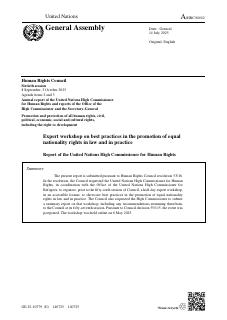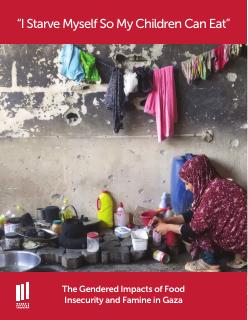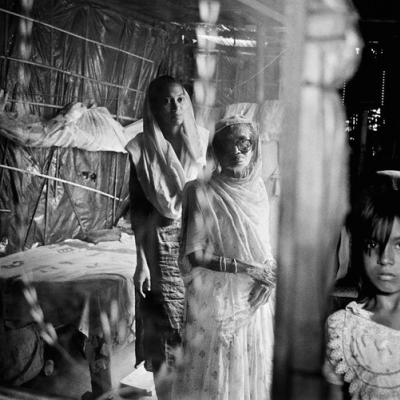“We are calling for equality, for women to have the same nationality rights as men, nothing more, nothing less. We are not asking for charity. We are calling for our equal rights.”
Habiba Al-Hinai, Executive Director for the Omani Association for Human rights
KEY MESSAGES
- Gender inequality in nationality law is a major cause of statelessness and derives from a legacy of colonialism and patriarchy.
- Most countries uphold gender equality in their nationality law, but 24 countries still discriminate against women in conferral of nationality to children; and 50 countries regarding acquisition, conferral, or changing of nationality.
- Patriarchal attitudes and practices also contribute to women’s unequal enjoyment of nationality rights, and can lead to risk of statelessness, even in cases where the law treats men and women equally.
- There are wide ranging impacts of gender discriminatory nationality laws, including gender-based violence, family separation, increased risk of trafficking and exploitation, child marriage, mental health issues and poverty.
- Gender discriminatory nationality laws are contrary to principles of equality and non-discrimination, which are enshrined in international human rights law.
- Equal nationality rights are crucial to preventing statelessness, protecting women, children and family rights, and ensuring social cohesion and national development.
GENDER DISCRIMINATION IN ACCESS TO NATIONALITY
Gender discriminatory nationality laws undermine women’s and children’s right to acquire nationality, and are one of the main causes of statelessness. Today, most countries uphold equal nationality rights for women and men. However, 24 countries worldwide still deny women the right to pass nationality to their children on an equal basis with men. Around 50 countries deny women equal rights as men in their ability to acquire, change or retain their nationality, or to confer nationality on non-national spouses.
Gender discriminatory nationality laws are a legacy of colonialism and patriarchy. Historically, women were treated differently to men under the nationality laws of most countries. In the early 20th century, states placed importance on ensuring that all members of a family held the same nationality, and due to patriarchal norms, this meant that children acquired their father’s nationality and women often changed nationality upon marriage, to acquire their husband’s citizenship. Colonial powers such as Britain, France and Belgium had nationality laws that made women ‘dependent’ on men in this way, exporting these rules around the world. As former colonies became independent, prevailing discrimination present in the nationality laws of colonising states was replicated in the nationality laws of the new states. Today, in addition to reinforcing prejudicial stereotypes and patriarchy, gender-discriminatory nationality laws may be used to exert demographic control over who is included and excluded by controlling women’s rights.
Gender discriminatory nationality laws are often compounded by intersecting forms of ethnic, religious, racial and linguistic discrimination, with the affected minorities facing serious obstacles in accessing their right to nationality. Women can also face other barriers to exercising equal nationality rights, even in cases where the law is gender neutral. Birth registration, for example, is crucial to preventing statelessness, yet many states limit mother’s ability to register births, or make it difficult to register children born out of wedlock. Furthermore, if patriarchal attitudes are particularly entrenched within a country, authorities may insist that the father is present to register a birth, even if the law does not specify this. In countries where ‘adultery’ is a criminal offence, parents may abandon their child to avoid criminal penalties; and if a parent chooses to register their child they still may be separated if there is criminal conviction. It is also important to note that while more countries discriminate against women, three countries deny men the right to pass citizenship to their child when they are born outside of marriage (Malaysia, Barbados, Bahamas); and in many more countries, it can be difficult in practice for children born outside marriage to access their father’s nationality.
PROTECTING GENDER EQUAL NATIONALITY LAWS
Gender discriminatory nationality laws are contrary to principles of equality and non-discrimination, which are enshrined in international human rights law and in many countries’ constitutions. International law protects the equal rights of women and men to acquire, retain or change their nationality, and to confer it on their children. Article 9 of CEDAW explicitly protects women’s equal nationality rights, and other international conventions, such as the ICCPR and the CRC protect the right of every child to a nationality, without discrimination.
In June 2014, at a side event to the UN Human Rights Council in Geneva, the Global Campaign for Equal Nationality Rights (GCENR) was launched. GCENR coalition members include local, regional and international NGOs, academics, civil society partners, UN agencies, and government allies across the world. With the aim of mobilising international action to end discrimination in nationality laws, the GCENR and its coalition members have been at the forefront of advocacy on this issue, bolstering efforts to reform nationality laws at the regional and national level, in a variety of ways, including through local activism, international advocacy, knowledge sharing, capacity building and research. Recent reforms to nationality laws have included Sierra Leone, Madagascar and Liberia.
UN human rights bodies such as the CEDAW Committee, CRC Committee and the Universal Periodic Review have actively promoted women’s equal nationality rights. In 2016, the UN Human Rights Council adopted a resolution on “The right to a nationality: women’s equal nationality rights in law and in practice”, laying the groundwork for increased engagement on the issue. Among subsequent initiatives, in 2017, the UN Working Group on discrimination against women and girls issued a position paper on the impacts of discriminatory laws concerning nationality on the enjoyment of women’s rights, and the rights of their children and spouses; and in 2023, the UN Special Rapporteur on violence against women and girls, Reem Alsalem, dedicated a thematic report to the issue of violence against women and girls, nationality laws and statelessness.
IMPACT OF GENDER DISCRIMINATORY NATIONALITY LAWS
There are wide ranging impacts of gender discriminatory nationality laws, including gender-based violence, family separation, increased risk of trafficking and exploitation, child marriage, mental health issues and poverty. Equal nationality rights are crucial to preventing statelessness, protecting women, children and family rights, and ensuring social cohesion and national development.
Gender-based violence
Unequal laws contribute to the primary root cause of gender-based violence: women’s unequal status in society. Women in abusive marriages may be unable to leave, as in some countries, if a woman acquires her foreign spouse’s nationality through marriage, upon divorce she may be stripped of that nationality, and accordingly lose rights, forcing her to stay in an abusive relationship. Similarly, if a woman has children who only have access to the father’s nationality, it may be difficult for her to return to her home country with her children when attempting to flee an abusive environment. Moreover, stateless women may be unable to access public healthcare, which inhibits treatment for survivors of gender-based violence, such as sexual and reproductive healthcare.
Family Unity
Gender discriminatory nationality laws threaten family unity, including the child’s right to know and be cared for their parents. If a man cannot acquire the nationality of his spouse, he may be forced to live away from the family due to difficulties acquiring residence permits and finding employment. Moreover, couples have even reported not starting a family because of the hardships their children would face due to the mother's inability to confer nationality to her children.
Trafficking and child marriage
Stateless women and girls are at a higher risk of being trafficked due to lack of access to education, formal employment, and documentation. Stateless women and girls may therefore be more likely to succumb to the exploitative promises of traffickers and smugglers, who may promise better opportunities elsewhere. Moreover, access to justice is limited for those without citizenship, which prevents prosecution of abusers and perpetrators. Some families regard early marriage as a route to security and citizenship for their daughters, and so gender-discriminatory nationality laws and statelessness can lead to an increase in child marriage. In countries where child marriage is illegal, these marriages can go unregistered, and lack of a marriage certificate then further increases the risk of childhood statelessness.
Lack of Economic Opportunities and Poverty
When women cannot confer nationality on their spouses, their husbands may be denied work permits and must often pay expensive residency permits. Women may therefore be forced to provide for the entire family. This is compounded by lack of access to social services. Denial of access to education for children can also lead to a life of economic hardship and barriers to formal employment, and this disenfranchisement may continue even when the parents pass away, as stateless children are often prevented from inheriting any of their parents’ assets, including the family home.
Mental Health Impacts
Many affected by gender discriminatory nationality laws experience psychological distress and social marginalisation as they are prevented from fully participating in economic, social, and political life. There have been reports of depression, anxiety, and feeling trapped. Children are often told, or feel, that they do not truly belong.
National Resiliency and Development
Gender discriminatory nationality laws inhibit individuals from fully contributing to society, hampering a country’s development, and negatively impacting at least 9 of the 17 Sustainable Development Goals (SDGs). Goal 5, in particular, on achieving gender and empowering women and girls, cannot be realised without the elimination of this discrimination. Equal nationality laws support greater national stability, economic development, good health and prosperity by allowing more people to contribute to their country’s economy and development. Eliminating discriminatory nationality laws promotes inclusion, family unity, and a more engaged citizenry.
[Last updated: October 2023]
Cover image by Greg Constantine
Further reading
Voices & Experiences
-
Gender Discrimination in Lebanon’s Nationality Laws
![Lebanon]()
Gender Discrimination in Lebanon’s Nationality Laws
![Lebanon]()
Nawal, a Lebanese citizen, married to a Frenchman, said her son Ziad “tried to apply for jobs after graduating, but they wouldn’t take him because he’d be an additional expense to them.”
Nawal
Lebanese citizen
In Lebanon, women can only pass on their nationality onto their child, if the child is born out of wedlock and recognised, while a minor, by the mother. Further, women cannot transfer their nationality onto their spouses either. This causes daily consequences in accessing basic rights due to the lack of Lebanese nationality.
Voice from https://nclw.gov.lb/wp-content/uploads/2022/09/2021_Nationality-not-Naturalization_Eng.pdf
(page 15) -
Gender discrimination in Nepal’s nationality law
![Nepal 1]()
Gender discrimination in Nepal’s nationality law
![Nepal 1]()
“There is going to be change” thanks to “an increasing awareness amongst policymakers that reform is needed and that gender equality in nationality laws should be embraced – that it is the right thing to do, and it is the smart thing to do”
Neha Gurung
Citizenship Affected Persons Network
Statelessness and the risk of statelessness is caused and exacerbated by Nepal’s gender-discriminatory Constitutional provisions and the Citizenship Act of 2063 (2006). Nepalese women do not enjoy equal citizenship rights and are prevented from passing their nationality to their children or to a foreign spouse, on equal terms with men, which can cause cases of statelessness. If a Nepalese woman is married to a non-Nepalese person, her children can acquire nationality by naturalisation only, rather than by descent. The conferral of such citizenship is rare and is not accessible for many.
Voice from https://mailchi.mp/8f681ef84cbc/monthly-bulletin-july-2023
-
Gender discrimination in Bahrain’s nationality laws
![Bahrain]()
Gender discrimination in Bahrain’s nationality laws
![Bahrain]()
“My children are treated like foreigners despite living and being born in Bahrain.”
Rahima
Bahraini woman
Rahima Naser is a Bahraini woman married to a non-national and mother of three children (two daughters and one son). Her children were ineligible for university scholarships, despite graduating from high school with honours, simply because they are not considered Bahraini.
Women in Bahrain cannot pass their nationality to their child on an equal basis as men. This discrimination perpetuates the risk of statelessness and contributes to violence against women and children. While Bahraini men have the automatic right to confer nationality on their children and may confer nationality on their noncitizen spouse, Bahraini women are denied this right, resulting in wide ranging human rights violations and undermining women’s equal citizenship.
Latest Resources: Women
-

podcast: Tales of Belonging #1: Living Without a Nationality
Type of Resource: Podcast
Theme: Women
Region: Europe
View -

Expert workshop on best practices in the promotion of equal nationality rights in law and in practice
Type of Resource: Report
Theme: Discrimination
Region: Global / Other
View -

“I Starve Myself So My Children Can Eat”: The Gendered Impacts of Food Insecurity and Famine in Gaza
Type of Resource: Report
Theme: Women
Region: Middle East and North Africa
View



